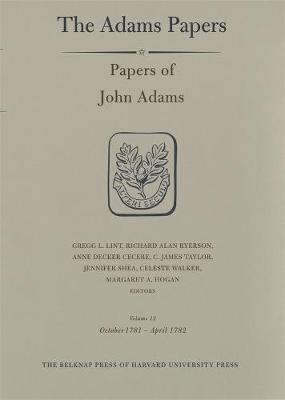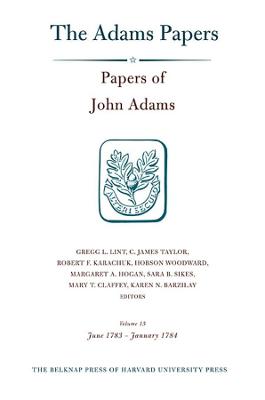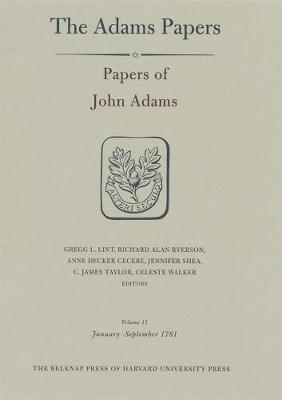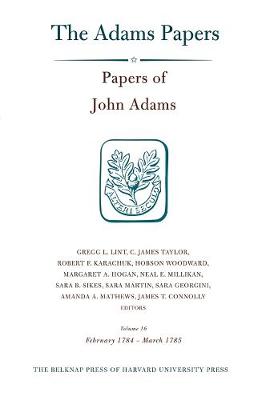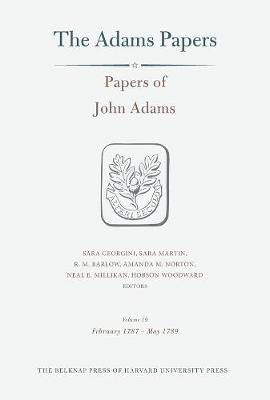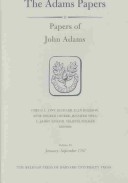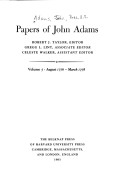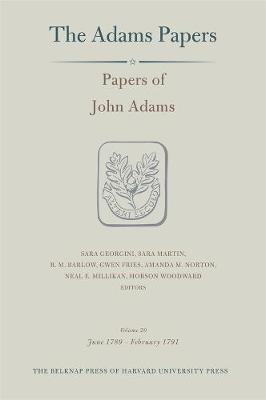General Correspondence and Other Papers of the Adams Statesmen
12 total works
John Adams reached Paris on October 26, 1782, for the final act of the American Revolution: the peace treaty. This volume chronicles his role in the negotiations and the decision to conclude a peace separate from France. Determined that the United States pursue an independent foreign policy, Adams's letters criticized Congress's naive confidence in France. But in April 1783, frustrated at delays over the final treaty and at real and imagined slights from Congress and Benjamin Franklin, Adams believed the crux of the problem was Franklin's moral bankruptcy and servile Francophilia in the service of a duplicitous Comte de Vergennes.
Volume 14 covers more than just the peace negotiations. As American minister to the Netherlands, Adams managed the distribution of funds from the Dutch-American loan. Always an astute observer, he commented on the fall of the Shelburne ministry and its replacement by the Fox-North coalition, the future of the Anglo-American relationship, and the prospects for the United States in the post-revolutionary world. But he was also an anxious father, craving news of John Quincy Adams's slow journey from St. Petersburg to The Hague. By May 1783, Adams was tired of Europe, but resigned to remaining until his work was done.
The American victory at Yorktown in October 1781 and the fall of Lord North’s ministry in March 1782 opened the possibility that John Adams might soon be involved in negotiations to end the war for American independence. To prepare for the occasion, Adams and Benjamin Franklin discussed in their letters the fundamentals for peace. Adams made it clear to the British government that there would be no negotiations without British recognition of the United States as independent and sovereign.
This volume chronicles Adams’s efforts, against great odds, to achieve formal recognition of the new United States. The documents include his vigorous response to criticism of his seemingly unorthodox methods by those who would have preferred that he pursue a different course, including Congress’s newly appointed secretary for foreign affairs, Robert R. Livingston.
In April 1782 the Netherlands recognized the United States and admitted John Adams as its minister. For Adams it was “the most Signal Epocha, in the History of a Century,” and he would forever see it as the foremost achievement of his diplomatic career. The volume ends with Adams, at long last a full-fledged member of the diplomatic corps, describing his reception by the States General and his audiences with the Prince and Princess of Orange.
On September 3, 1783, John Adams, Benjamin Franklin, and John Jay signed the definitive Anglo-American peace treaty. Adams and his colleagues strived to establish a viable relationship between the new nation and its largest trading partner but were stymied by rising British anti-Americanism.
Adams’ diplomatic efforts were also complicated by domestic turmoil. Americans, in a rehearsal for the later Federalist-Antifederalist conflict over the United States Constitution, were debating the proper relationship between the central government and the states. Adams, a Federalist as early as 1783, argued persuasively for a government that honored its treaties and paid its foreign debts. But when bills far exceeding the funds available for their redemption were sent to Europe, he was forced to undertake a dangerous winter journey to the Netherlands to raise a new loan and save the United States from financial disaster.
None of the founding fathers equals the candor of John Adams’ observations of his eighteenth-century world. His letters, always interesting, reveal with absolute clarity Adams’ positions on the personalities and issues of his times.
These volumes provide an unparalleled account of the conduct of American diplomacy in the early years of the republic, while the war with Britain continued and after the treaty of alliance with France was signed. John Adams served for ten months as a commissioner to France. Though he was the newest member of the three-man commission, he was its chief administrator, handling most of its correspondence, and his papers are the first full documentary record of the commission ever published. They provide a wealth of detail on every aspect of diplomacy, from negotiations with ministers of state to the arranging of prisoner exchanges.
The documents throw new light on Adams’s relations with his fellow commissioners, Benjamin Franklin and Arthur Lee. Historians have depicted Adams as hostile to Franklin and supportive of Lee, but the record shows that he found himself increasingly in disagreement with Lee, while working harmoniously with Franklin from the outset. Moreover, after the commission was disbanded in February 1779 and Franklin was appointed Minister to France—a move Adams had advocated—he undertook an important mission at Franklin’s behest. It is now clear that the rift that developed between the two statesmen did not begin until after Adams’s return to Paris in 1780.
Legal and constitutional scholars will find Volume 8 of particular interest. The Massachusetts Constitution of 1780, drafted by John Adams in 1779, served as a crucial source for the Constitution of the United States; today it is the oldest written constitution in the world still in effect. The earliest surviving version of Adams’s text, the Report of a Constitution for the Commonwealth of Massachusetts, is here published with full annotation for the first time. It is John Adams’s most enduring constitutional work.
In mid-March 1781, John Adams received his commission and instructions as minister to the Netherlands and embarked on the boldest initiative of his diplomatic career. Disappointed by the lack of interest shown by Dutch investors in his efforts to raise a loan for the United States, Adams changed his tactics, and in a memorial made a forthright appeal to the States General of the Netherlands for immediate recognition of the United States. Published in Dutch, English, and French, it offered all of Europe a radical vision of the ordinary citizen’s role in determining political events. In this volume, for the first time, the circumstances and reasoning behind Adams’s bold moves in the spring of 1781 are presented in full.
In July the French court summoned Adams, the only American in Europe empowered to negotiate an Anglo–American peace, to Paris for consultations regarding an offer made by Austria and Russia to mediate the Anglo–French war. In his correspondence with France’s foreign minister, the Comte de Vergennes, Adams passionately insisted that the United States was fully and unambiguously independent and sovereign and must be recognized as such by Great Britain before any negotiations took place. This volume shows John Adams to be a determined and resourceful diplomat, unafraid to go beyond the bounds of traditional diplomacy to implement his vision of American foreign policy.
“Once more after an Interruption of ten Years, I pronounce myself a happy Man, and pray Heaven to continue me so.” Thus wrote John Adams in late August 1784 after the arrival in Europe of his wife Abigail and daughter Nabby. Adams and his family were living together in the pleasant Paris suburb of Auteuil. There Adams, with Benjamin Franklin and Thomas Jefferson, formed a joint commission to conclude commercial treaties with the nations of Europe and North Africa. For the first time since he had left America in 1778 on his first diplomatic mission, Adams was no longer engaged in “militia diplomacy.”
Volume 16 of the Papers of John Adams chronicles fourteen months of Adams’ diplomatic career. As minister to the Netherlands he raised a new Dutch loan to save America from financial ruin. As joint commissioner he negotiated a commercial treaty with Prussia, proposed similar treaties with other European nations, and prepared to negotiate with the Barbary states. The commissioners also sought to resolve Anglo-American differences left over from the peace negotiations and arising from the two nations’ burgeoning trade. Volume 16 thus forms a prelude to the next phase of John Adams’ diplomatic career, for his February 1785 appointment as minister to the Court of St. James meant that the management of Anglo-American relations would be his responsibility alone.
“Huzza for the new World and farewell to the Old One,” John Adams wrote in late 1787, wrapping up a decade’s worth of diplomatic service in Europe. Volume 19 of the Papers of John Adams chronicles Adams’s last duties in London and The Hague. In the twenty-eight months documented here, he petitioned the British ministry to halt impressment of American sailors, toured the English countryside, and observed parliamentary politics. Adams salvaged U.S. credit by contracting two new Dutch loans amid the political chaos triggered by William V’s resurgence. Correspondents like Thomas Jefferson and the Marquis de Lafayette mulled over the Anglo–American trade war that followed the Revolution and reported on the French Assembly of Notables—topics that Adams commented on with trademark candor. He wrote the final two volumes of his work, A Defence of the Constitutions of Government of the United States of America.
Adams yearned to return home and see the American republic take shape. “For a Man who has been thirty Years rolling like a stone,” Adams wrote, the choice was whether to “set down in private Life to his Plough; or push into turbulent scenes of Sedition and Tumult; whether be sent to Congress, or a Convention or God knows what.” Back on his native soil of Massachusetts in June 1788, Adams settled into rural retirement with wife Abigail and watched the U.S. Constitution’s ratification evolve. By volume’s end, John Adams again resumes public life, ready to serve as America’s first vice president.
No family in three generations has contributed so much to American history as the Adamses. John Adams, John Quincy Adams, and Charles Francis Adams, despite periods of doubt, knew that history, if not their contemporaries, would recognize their accomplishments. When the Adams Papers series is complete, the writings of these three statesmen will have been examined thoroughly.
Aside from the Legal Papers of John Adams, published in 1965, these two volumes are the first in Series III: General Correspondence and Other Papers of the Adams Statesmen. Volumes 1 and 2 of the Papers of John Adams include letters to and from friends and colleagues, reports of committees on which he served, his polemical writings, published and unpublished, and state papers to which he made a contribution.
All of Adams’s newspaper writings, including “A Dissertation on the Canon and the Feudal Law,” are in these two volumes. In addition to being a condemnation of the Stamp Act, the “Dissertation” is shown to be one of the building blocks of the theory of a commonwealth of independent states under the king, which reaches complete statement in the Novanglus letters. For the first time, all thirteen of these letters appear in full with annotation.
The period September 1755 to April 1775 covers Adams’s public service in Braintree and Boston town meetings, the Massachusetts House of Representatives, the First Continental Congress, and the First Provincial Congress of Massachusetts. During this time his political future was being shaped by circumstances not always of his choosing. He hesitated at first at the threshold of a public career, political ambition in conflict with concern for his family’s well-being. But as the confrontation with Great Britain sharpened, the crisis became acute; no choice remained. For Adams there was no shirking the path of duty.
As the American colonies grew more restive, and a break with the mother country ceased to be unthinkable, John Adams was forced to spend less and less time with his beloved family. Although burdened by ever-expanding responsibilities in the Second Continental Congress, he found time for an amazing amount of correspondence. The majority of his letters were written to secure the facts that would enable this duty-ridden man to decide and act effectively on the issues being debated. Military affairs, a source of never-ending concern, provide some of the most fascinating subjects, including several accounts of the Battle of Bunker Hill, assessments of various high-ranking officers, and complaints about the behavior of the riflemen sent from three states southward to aid the Massachusetts troops.
The heated question of pay for soldiers and officers strained relations between New England and southern colonies early. By refusing to confront the issue of slavery when it was raised by several correspondents, Adams sought to avoid exacerbating regional sensitivities further. When the question of independent governments for former colonies arose, at the request of several colleagues Adams sketched a model, Thoughts on Government, three versions of which are included here.
His optimistic republicanism, however, was balanced by fear that a “Spirit of Commerce” would undermine the virtue requisite for republican institutions. Adams' important committee work included his draft in 1775 of rules for regulation of the Continental Navy, which have remained the basis for the governance of the United States Navy down into our own time, and his plan of treaties, which would guide American diplomats up to World War II. Both were derivative, but he skillfully adapted his materials to American needs and circumstances. These volumes reflect the spirit of those tumultuous years when the leaders emerging in America confronted each other, and exciting new ideas, as they tried to resolve the issues of a revolutionary period.
These volumes document John Adams’s thinking and actions during the final years of his congressional service and take him through his first five months as a Commissioner in France in association with Benjamin Franklin and Arthur Lee.
While Adams was still in Philadelphia, military matters continued to he his major concern. Most demanding was his presidency of the Board of War, which took up his “whole Time, every Morning and Evening.” In general, though, the documents and reports of his conduct reveal a commitment to a national outlook. Congress should be a national legislature, and personal, state, and regional rivalries should give way to concern for the greater good—these were his deeply held convictions.
When chosen a Commissioner to France, Adams was reluctant to go. But duty and the honor of the position, along with the encouragement of an understanding and self-sacrificing wife, persuaded him to accept. With son John Quincy for a companion, he crossed the Atlantic to a new career. His initiation into the complexities of diplomacy brought a growing awareness of European affairs and the problems facing the new nation in the diplomatic arena. Letters deal with such varied topics as the supervision of American commercial agents in French ports, regulation of privateers, settlement of disputes between crews and officers, negotiation of loans, and help for American prisoners in England. Personal letters run the gamut from Adams’s views on the proper conduct of American diplomacy to strangers’ pleas for aid in locating relatives in America. Contrary to the usual impression of Adams as little more than a clerk for the Commission, evidence shows that he was its chief administrator.
Acclimation to living abroad among diplomats did not stifle Adams’s yearning for the simplicities of private life in the midst of his family. Yet as the important and interesting documents of this volume show, the groundwork was being laid for his even more significant role in diplomacy.
On the last day of December 1780, John Adams wrote that he had just spent “the most anxious and mortifying Year of my whole Life.” He had resided first at Paris, then at Amsterdam, attempting, without success, to open Anglo–American peace negotiations and to raise a Dutch loan. In volumes 9 and 10 of the Papers of John Adams, over 600 letters and documents that Adams sent to and received from numerous correspondents in Europe and America provide an unparalleled view of Adams’s diplomacy and a wealth of detail on the world in which he lived.
These volumes chronicle Adams’s efforts to convince the British people and their leaders that Britain’s economic survival demanded an immediate peace; his “snarling growling” debate with the French foreign minister, the Comte de Vergennes, over the proper Franco–American relationship; and his struggle to obtain a loan in the Netherlands, where policies were dictated by Mammon rather than republican virtue. Adams’s writings, diplomatic dispatches, and personal correspondence all make clear the scope of his intelligence gathering and his propaganda efforts in the British, French, and Dutch press. The letters reflect his interest in Bordeaux wines, the fate of Massachusetts Constitution that he had drafted in 1779, and political developments in Philadelphia, Boston, London, and St. Petersburg. The volumes leave no doubt as to John Adams’s unwavering commitment to the American cause. Even in this most difficult year, he believed the revolution in America to be “the greatest that ever took Place among Men.” He felt honored to serve a new nation where “the Wisdom and not the Man is attended to,” whose citizens were fighting a “People’s War” from which the United States would inevitably emerge victorious to take its rightful place on the world stage.

